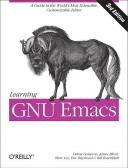Книга: Learning GNU Emacs, 3rd Edition
What We Haven't Included
What We Haven't Included
GNU Emacs is a large and powerful editor; in this book, we give you only a sample of what it does. Many features have been left out, and more features are added all the time. Some topics, however, are not covered:
Compatibility modes
GNU Emacs provides compatibility modes for vi, for example. We've left a discussion of these modes out. If you really want to use vi or another editor, do so. You're better off getting to know Emacs on its own terms rather than pretending it is something else.
Many programming language modes
In this book, we discuss editing modes for C++, Java, Lisp, Perl, and SQL. There are many modes for other languages, including rare languages like Scheme. There's no way we could discuss everything.
Advanced Lisp programming
GNU Emacs incorporates a complete Lisp interpreter. We give a very basic and brief introduction to Emacs Lisp; Chapter 11 should be enough to get you started, but it really only scratches the surface. We recommend the FSF's Emacs Lisp Reference Manual, now included in the Emacs distribution.
Using Emacs to access the Internet
When our last edition came out, it was common to use Emacs to access Internet resources or read email. Now that isn't so common; better mailers, browsers, and other tools are commonly in use on all platforms.
Unicode support
At present, Emacs is on its way to full Unicode support; that is the most important change slated for the next major release. At this writing, Unicode support is spotty.
Games and amusements
GNU Emacs includes an eclectic bunch of games and amusements, including the ability to pipe random quotations from Zippy the Pinhead into the famous "Eliza" pseudopsychoanalyst. Emacs 21 includes a Games menu under Tools with several cool ways to waste time in Emacs (and it doesn't even include Emacs's version of pong, one of our favorites). Alas, we had to draw the line somewhere.




